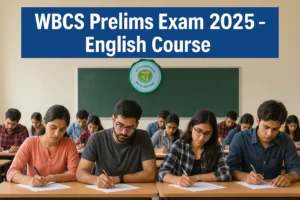WBCS Prelims English Language
About Course
West Bengal Civil Service (Executive) etc. Examination – Preliminary 2025
We offer a complete guide with in-depth classes on the English language for WBCS Prelims and Mains. This particular course focuses on the Prelims examination, scheduled to be held in November this year.
A Brief cverage / content of the WBCS English Prelims Exam is given here –
|
Step |
Topic |
Concepts to Cover |
|
1 |
Synonyms |
Words with similar meaning, roots, prefixes, suffixes |
|
2 |
Antonyms |
Opposite words, negating prefixes (un-, dis-, in-) |
|
3 |
Vocabulary Test |
Synonyms, antonyms, homophones, word usage |
|
4 |
Idioms & Phrases |
Figurative meanings, non-literal use |
|
5 |
One-Word Substitution |
Replacing phrases with single word |
|
6 |
Phrasal Verbs |
Verb + preposition/adverb → new meaning |
|
7 |
Words with Multiple Meanings |
Polysemy & contextual meaning |
|
8 |
Appropriate & Qualifying Words |
Right word choice (adjectives/adverbs) |
|
9 |
Parts of Speech (Basics) |
Noun, verb, adjective, adverb, tense |
|
10 |
Parts of Speech (Advanced) |
Complex usage in sentences |
|
11 |
Articles |
Usage of a, an, the |
|
12 |
Prepositions |
Relation (place, time, direction), fixed usage |
|
13 |
Gerund |
-ing verbs as nouns |
|
14 |
Modals |
Can, may, must, should, etc. |
|
15 |
Subject-Verb Agreement |
Singular/plural consistency |
|
16 |
Voice Change |
Active ↔ Passive |
|
17 |
Narration Change |
Direct ↔ Indirect speech |
|
18 |
Interjection |
Expressing emotions |
Course Content
Vocabulary Development Strategy
-
Synonyms
09:34 -
Antonyms
08:07 -
Vocabulary Test
09:26 -
Idioms & Phrases
-
One Word Substitution
11:46 -
Phrasal Verb
09:03 -
Words with Multiple Meanings
13:25

